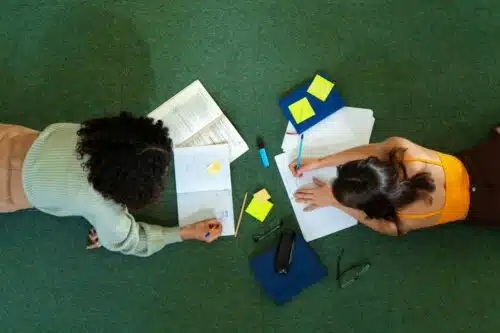Student Advocacy: Ways Colleges Are Redefining Autism Support

Here, he thrives, diving into his passion for data science without the pressure to mask his differences. Alex’s story is part of a larger wave: the neurodiversity movement sweeping college campuses, where autistic young adults are demanding—and creating—student advocacy support systems that celebrate their unique strengths.
As autism diagnoses rise (1 in 31 children in 2025, per the CDC), more autistic students are entering higher education, reshaping what inclusion looks like. That’s where autism support groups come in, as young adults with autism spectrum disorder are leading a cultural shift, from peer mentoring to sensory-friendly spaces, and why their advocacy matters for every college student navigating identity and belonging.
The Surge of Autistic Students in Higher Education
Autism prevalence through better diagnosis has climbed steadily, from 1 in 36 children in 2020 to 1 in 31 in 2025, according to the CDC’s latest Autism and Developmental disabilities Monitor Network report. Better diagnostic tools and awareness mean more autistic individuals are pursuing college. But higher education hasn’t always kept pace.
Traditional disability services, often designed for physical disabilities, can feel like a square peg for the round hole of autism. Autistic students face sensory overload in crowded lecture halls, social pressures in group projects, and rigid academic structures that don’t account for their needs. A 2023 study in the Journal of Autism and Developmental Disorders found that autistic students drop out at a rate of 30%, compared to 20% for neurotypical peers, often due to inadequate support.
Autistic students often share raw insights into these challenges. One tweeted, “My college’s disability office told me to ‘just cope’ with noisy classrooms. I need a space to think, not a lecture on grit.” Another posted, “Group projects are torture when you’re autistic. Professors don’t get it.” These voices underscore a critical truth: autistic young adults aren’t just asking for accommodations—they’re demanding environments through student advocacy where they can thrive as themselves.
This push aligns with the neurodiversity movement, which views autism as a natural variation of human cognition, not a deficit to be fixed.
The Neurodiversity Movement: A New Vision for Campus Inclusion
The neurodiversity paradigm, championed by groups like the Autistic Self Advocacy Network, rejects the idea that autism needs “curing.” Instead, it celebrates cognitive differences—like intense focus, pattern recognition, or creative problem-solving—as strengths.

Sensory-friendly spaces are another game-changer. Universities like NYU and the University of Michigan have invested in quiet rooms with dimmable lights and noise-canceling features. A Michigan student tweeted, “The sensory room saved my semester. I can study without my brain feeling like it’s on fire.”
These spaces, often costing $10,000–$50,000 to build, are a direct response to autistic students’ needs, allowing them to recharge without sensory overload.
Meanwhile, colleges like Oberlin are experimenting with flexible policies, such as extended deadlines or virtual class options, which reduce stress without compromising rigor. These initiatives reflect a broader shift: colleges are moving beyond compliance with the Americans with Disabilities Act (ADA) to create environments where autistic students can leverage their strengths. In other words, autism support groups work!
For example, a 2024 report from the College Autism Spectrum noted that schools with robust neurodiversity programs see graduation rates for autistic students rise by 15%. This isn’t just about retention—it’s about recognizing that autistic minds bring unique perspectives to academia, from hyper-detailed research to innovative problem-solving.
Young Adults Leading the Charge Through Student Advocacy
The heart of this movement lies with autistic young adults themselves. Sarah, a 20-year-old at UC Berkeley, tweeted, “I got diagnosed at 18 and started a neurodiversity club to show we’re not ‘broken.’ We just think differently.” Her club hosts workshops on self-advocacy, teaching students to request accommodations without shame. Similarly, Jay, a 19-year-old at UT Austin, shared, “I was diagnosed last year. Now I’m fighting for sensory-friendly dorms. We deserve to feel safe.”
Student advocacy shows that autistics aren’t just adapting to college—they’re reshaping it. Campus programs are amplifying these efforts by offering coaching and community-building. One participant, Mia, told Autism Spectrum News, “I learned to explain my needs to professors without feeling like a burden. It’s empowering.” These stories resonate with young adults exploring their identities, especially those newly diagnosed in their teens or early 20s—a common experience as diagnostic criteria expand.
A recent thread on social media by an autistic student went viral: “Late diagnosis at 21 changed everything. I’m not ‘weird’—I’m neurodivergent, and I’m building a life that fits me.” That’s a quote that I can wholeheartedly support that defines me as well.
This advocacy mirrors broader themes of self-discovery and community that define young adulthood. Autistic students are creating spaces—online and on campus—where they can be authentic, much like their neurotypical peers seek belonging through clubs or activism. The difference? Their fight challenges systemic ableism, making their impact even more profound.
Student Advocacy Challenges and Pushback of Autism Support Groups

Stigma also persists. Some students hide their diagnoses to avoid judgment, as a 2024 Autism Speaks survey found that 40% of autistic college students fear discrimination. One student shared, “I don’t tell my professors I’m autistic. They’ll think I’m less capable.” Budget constraints further complicate things—sensory rooms and mentoring programs require funding that many schools prioritize elsewhere. Yet, the momentum is undeniable.
Autistic students are forming coalitions, using social media platforms to share strategies and demand change, much like young adults drive broader social movements.
The Bigger Picture: Why This Matters for All Young Adults
The neurodiversity movement isn’t just about autism—it’s about redefining inclusion for everyone. Young adults, whether neurodivergent or not, grapple with finding their place in a world that often demands conformity. Autistic students’ fight for sensory-friendly spaces or flexible policies benefits others, like students with anxiety or ADHD, who also need tailored support.
A 2025 Chronicle of Higher Education report noted that neurodiversity initiatives improve campus mental health resources overall, creating a ripple effect.
I’m happy to say that this movement is challenging colleges to rethink success. Autistic students bring strengths—deep focus, unique perspectives—that enrich academic communities. A professor at Rochester told Disability Scoop, “My autistic students ask questions no one else does. They push us to think harder.” By amplifying these voices, colleges foster environments where all students can explore their identities without shame.
Autism in Adults: Living, Learning, and Overcoming Challenges for a Fulfilled Life
Autism in adults requires additional support and coping skills to achieve independence in today’s world.
Learn more about ways adults can live fulfilled lives and the challenges they face.
- 14 Practical Ways for Staying Motivated to Unlock Full Potential
- Autism and Independence: 7 Skills That Empower Individuals to Thrive
- Dangers of Social Media Addiction: How To Leave the Screens And Face the Real World
- Autism Volunteer Opportunities: 5 Ways Helping Others Fosters Acceptance
- 8 Heartfelt Ways Autism Emotional Support Animals Transform Lives
- Are You An Adult With Autism? Here Are 6 Signs
- Autism After High School: Is College the Next Step?
- Autism vs Asperger’s Syndrome: What You Need to Know
- Autism Disclosure: Is Revealing Your Disorder Helpful or Hurtful?
- Work and Autism: What Employers Should Know About Hiring People with Neurodiversity
- Drivers with Autism Can Achieve Success Behind the Wheel